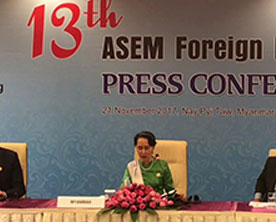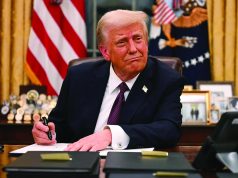The 13th ASEM Foreign Ministers’ Meeting took place at Myanmar International Convention Centre I in Nay Pyi Taw from November 20 to 21 under the concept of ‘Strengthening Partnership for Peace and Sustainable Development’.
It was the first time for Myanmar to host the foreign ministerial meeting of ASEM, which is an Asia-Europe political forum aiming to promote relations and various forms of cooperation among the 53 partners that include 51 nations, the ASEAN Secretariat and the European Union Commission.
State Counsellor and Minister for Foreign Affairs Aung San Suu Kyi delivered an opening speech at the opening ceremony of the meeting that started in the morning of November 20, attended by foreign ministers, deputy ministers, and senior representatives from the ASEAN Secretariat and the European Union Commission.
O p e n i n g s p e e c h e s o f r e g i o n a l coordinators of ASEM followed, as coordinator for ASEAN Jose Luis Montales who is Under Secretary from the Philippines’ foreign affairs ministry, coordinator for North-east and South Asia Imtiaz Ahmand who is Additional Secretary (Asia Pacific) representing the foreign ministry of Pakistan and coordinator for Europe Sven Mikser who is Estonian foreign minister gave their respective opening speeches. Federica Mogherini, Vice President of the European Commission and High Representative of the European Union representing the European External Action Service, also gave an opening speech.
The first day of the 13th ASEM Foreign Ministers’ Meeting was organised into two plenary sessions. The first session, titled ‘Synergizing Peace and Sustainable Development’ held in the morning, emphasised the promotion of peace and sustainable development among and beyond the ASEM forum participating countries. The session was launched with a speech from State Counsellor and Minister for Foreign Affairs Aung San Suu Kyi. Foreign ministers, deputy ministers and delegation leaders from a group of participating countries including China, the European Union, Republic of Korea and Vietnam offered their discussions at the session.
The later took place in the afternoon to convene on the title of ‘3rd Decade of ASEM: Making ASEM Partnership More Dynamic and Connected’, aiming to put the discussions on the focus of seekingways that enable the enhancement of capacity and connectivity among the ASEM partners in the third decade of the forum. Aung San Suu Kyi gave a speech, and the session saw discussions from foreign ministers, deputy ministers and delegation leaders representing a group of participating countries that include Hungary, Russia, China and Spain. The importance of the role of ASEM has come to a next level as the world is going through a time which demands international cooperation to tackle the global issues amidst the changes and difficulties, said Vice President of the European Commission Federica Mogherini. Asia is perceived to have high potential for substantial economic development and there exist many areas that will allow Europe to benefit Asia through cooperation and partnership, she said.
At a press conference that followed the 13th ASEM Foreign Ministers’ Meeting, Aung San Suu Kyi said that the meeting tabled important issues and ended up with significant improvements, achieving the development of the present ASEM connectivity that was decided to pursue at the 11th ASEM Summit held in Mongolia last year. The discussions at the meeting are believed to contribute to future processes of ASEM and lead to achievement of peace and sustainable development as well as mutual benefits for the peoples of the partner countries, she said at the press conference that was organised on November 21 in Nay Pyi Taw. Ildefonso Castro, Secretary of State of Spain which will host the next ASEM foreign ministerial meeting, stressed the need for infrastructure development in his discussions. The Myanmar meeting was meant to address common challenges and exchange views among the countries from two continents, he said.
Representatives discussed a wide range of issues including security, trade, climate change and sustainable development at the two-day forum. The discussions also took some of global pressing matters such as Korean Peninsula and Ukraine crises along with nuclear non-proliferation. Estonian foreign minister Aven Mikser, a special representative from the EU, remarked that the meeting was very successful. ASEM discussions were launched in 1996 with a purpose of connectivity promotion between Asia and Europe. 15 fifteen founding members of the forum are China, Japan, South Korea, the then 7 members of the ASEAN (Association of South-east Asian Nations), the European Union and the European Commission. The aggregate of the ASEM forum partner nations share 60 per cent of global GDP (gross domestic product) and cover 60 per cent of world population, amounting to 60 per cent of global trade.
A total of 54 delegation leaders and more than 500 delegation members attended the 13th ASEM Foreign Ministers’ Meeting. The previous foreign ministers’ meeting was held in Luxembourg in 2015, and the next round of foreign ministerial meeting will be hosted by Spain in 2019. The 11th ASEM Summit was held in Mongolia in 2016, and the upcoming summit will take place in Brussels in 2018.
The current partner countries of ASEM are Austria, Australia, Bangladesh, Belgium, Brunei Darussalam, Bulgaria, Cambodia, China, Croatia, Cyprus, the Czech Republic, Denmark, Estonia, Finland, France, Germany, Greece, Hungary, India, Indonesia, Ireland, Italy, Japan, Kazakhstan, Kore, Lao, Latvia, Lithuania, Luxembourg, Malaysia, Malta, Mongolia, Myanmar, the Netherlands, New Zealand, Norway, Pakistan, the Philippines, Poland, Portugal, Romania, Russia, Singapore, Slovakia, Slovenia, Spain, Sweden, Thailand, the United Kingdom and Vietnam.










